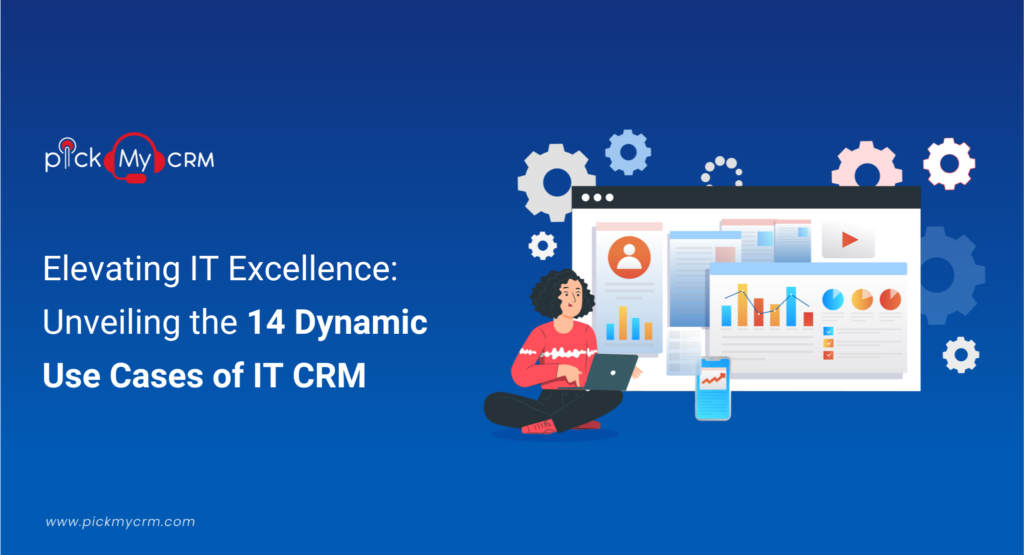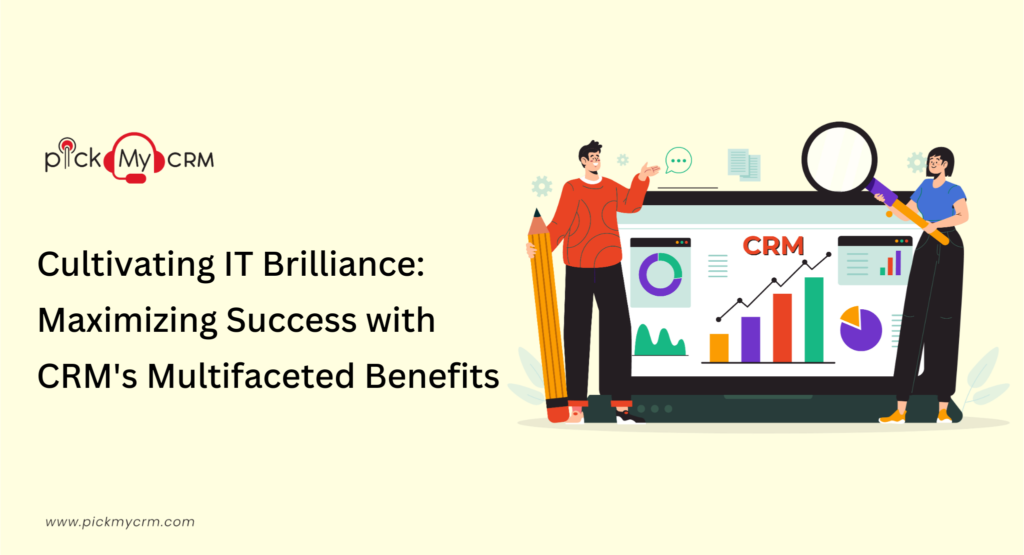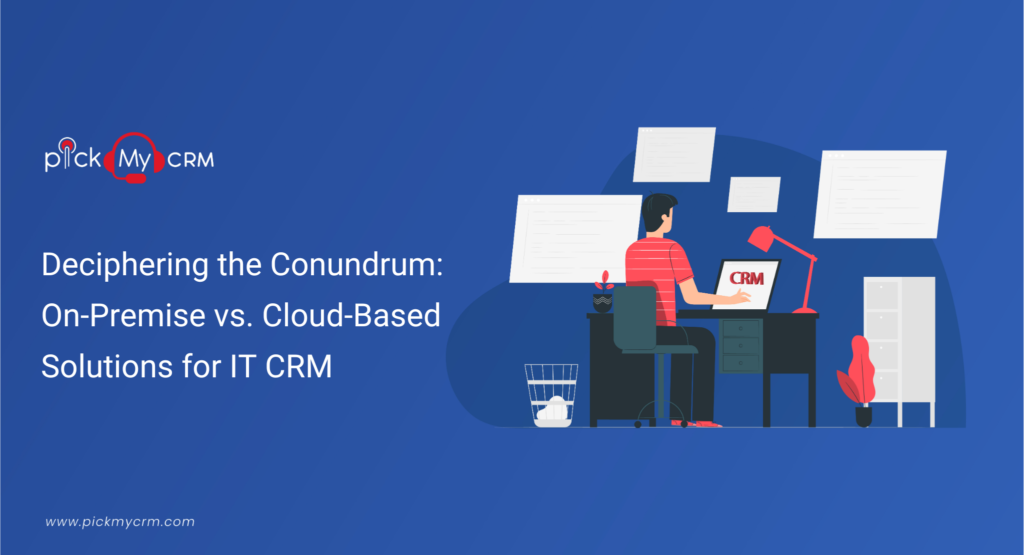Elevating IT Excellence: Unveiling the 14 Dynamic Use Cases of IT CRM
14 Powerful Use Cases of IT CRM: Unleashing the Potential
In the ever-evolving landscape of Information Technology (IT), customer relationships are the Driving force behind success. As IT businesses strive to deliver cutting-edge solutions and unmatched services, harnessing the capabilities of Customer Relationship Management (CRM) systems has become more crucial than ever. Let's dive into compelling use cases of IT CRM that are revolutionizing the industry and helping businesses thrive.Streamlining IT Service Management
Efficiency and effectiveness are the cornerstones of IT service management. With IT CRM systems seamlessly integrated into the Workflow, organizations can streamline their service desk operations. The ability to automate incident reporting, assign tasks, and monitor resolutions significantly reduces response times, leading to improved customer satisfaction and operational excellence.Client Onboarding and Relationship Management
Starting a client relationship on the right foot is essential for long-term success. IT CRM systems streamline the client onboarding Process by automating data collection, contract signing, and initial communications. Once onboarded, these systems enable businesses to nurture relationships through personalized interactions, understanding client needs, and delivering tailored solutions.Lead Generation and Conversion
Efficiently managing leads is a significant challenge in the competitive IT landscape. CRM solutions provide tools to Track, Categorize, and Engage Leads based on their interactions and interests. By analyzing data and behavior, IT companies can customize their marketing efforts and increase the likelihood of lead conversion, expanding their client base.Project Management and Collaboration
IT projects often involve intricate workflows and collaboration among various teams. CRM systems can extend to serve as project management hubs, facilitating real-time collaboration, task allocation, and progress monitoring. Integration with project management tools optimizes communication, minimizes duplication of effort, and Guarantees the fulfillment of project deadlines.Optimizing IT Asset Management
IT assets are the lifeblood of an organization's technological infrastructure. IT CRM systems offer comprehensive asset management capabilities, enabling businesses to track, monitor, and optimize their IT assets efficiently. This results in cost savings, reduced downtime, and improved asset utilization, elevating IT excellence through prudent resource management.Automating Routine Tasks
Routine tasks often consume valuable IT resources. IT CRM software solutions come with built-in automation capabilities designed to efficiently manage repetitive tasks, including but not limited to software updates, patch management, and system backups. By automating these processes, organizations can free up their IT staff to focus on more strategic initiatives, fostering a culture of innovation and agility.Customer Support and Issue Resolution
Quick and efficient customer support is paramount in the IT industry. CRM systems centralize customer inquiries, categorize issues, and enable seamless support across multiple channels. By maintaining a comprehensive history of interactions, support teams can provide personalized solutions, resolve issues faster, and enhance customer satisfaction.Data Analysis and Business Intelligence
Data is a goldmine of insights for IT businesses. CRM systems gather and analyze customer data, revealing trends, preferences, and usage patterns. These insights drive informed decisions, allowing Businesses to Optimize resources, Refine strategies, and Identify growth opportunities. Predictive analytics also enable upselling and cross-selling to existing clients.Feedback Collection and Continuous Improvement
To stay competitive, IT companies must continually innovate and improve their offerings. CRM systems facilitate feedback collection from clients, helping identify areas for enhancement. By actively engaging with customer suggestions and concerns, businesses can refine their products, services, and processes, ultimately leading to higher satisfaction and loyalty.Sales Process Enhancement
CRM systems streamline the Sales process by providing a comprehensive view of leads and prospects. Sales teams can track interactions, prioritize leads, and tailor their approaches based on individual preferences. It enhances the sales cycle, shortens conversion times, and boosts revenue generation.Marketing Campaign Optimization
Targeted marketing is crucial in reaching the right audience. CRM systems segment clients based on demographics, behaviors, and preferences, enabling businesses to create personalized marketing campaigns. Offering relevant content and compelling incentives can increase engagement Rates and Achieve higher conversion rates.Contract and Subscription Management
Managing contracts and subscriptions manually can be cumbersome. IT CRM systems automate contract creation, renewal reminders, and subscription management. It ensures timely renewals, prevents revenue leakage, and enhances the customer experience.Competitive Analysis and Market Insights
Maintaining a competitive edge demands a comprehensive grasp of the market dynamics. CRM systems can track competitor information and provide insights into market trends. This intelligence helps IT businesses adapt strategies, refine product offerings, and seize new opportunities.Realizing Cost Savings
Cost efficiency plays a pivotal role in achieving IT excellence. The implementation of IT CRM solutions can yield substantial cost reductions through the optimization of resource allocation, process automation, and the minimization of IT downtime. These cost savings can fuel strategic IT initiatives that propel the organization forward. IT CRM systems offer a versatile toolkit that empowers businesses to thrive in the dynamic IT industry. From optimizing client interactions to refining processes and enhancing market intelligence, these use cases exemplify how CRM systems are innovative and successful for IT enterprises.Examples of IT CRM Use Cases
Here are some practical examples of use cases for IT CRM (Customer Relationship Management) systems,Sales and Lead Management
- Use Case: Tracking and managing sales leads, prospects, and customer interactions.
- Example: Sales teams can use the CRM to record customer inquiries, track sales opportunities, set reminders for follow-up calls, and analyze sales pipeline data for better decision-making.
Customer Support and Service
- Use Case: Providing efficient customer support and service through case management.
- Example: Customer support teams can use the CRM to log customer issues, assign support tickets, track case resolution progress, and maintain a knowledge base for quicker issue resolution.
Marketing Campaigns and Lead Nurturing
- Use Case: Running targeted marketing campaigns and nurturing leads.
- Example: Marketing teams can utilize the CRM to segment customer data, send personalized email campaigns, track campaign performance, and score leads based on their engagement.
Contact Management
- Use Case: Organizing and managing customer and prospect contact information.
- Example: Businesses can use CRM to maintain a centralized Database of contacts, categorize them into specific lists or groups, and keep records of communication history.
Analytics and Reporting
- Use Case: Analyzing data to gain insights into customer behavior and performance.
- Example: CRM systems offer robust reporting tools that allow organizations to generate custom reports and dashboards, providing insights into sales trends, customer satisfaction, and other metrics.
Inventory and Order Management
- Use Case: Managing inventory levels and processing customer orders.
- Example: E-commerce businesses can use the CRM to monitor product availability, receive and process orders, track shipments, and update customers on order status.
Social Media Integration
- Use Case: Integrating social media interactions and insights.
- Example: CRM systems can connect with social media platforms to capture customer interactions, monitor brand mentions, and analyze social media data to gauge customer sentiment.
Workflow Automation
- Use Case: Automating repetitive tasks and processes.
- Example: Organizations can automate tasks like sending welcome emails, assigning leads to sales reps, or triggering follow-up actions based on predefined criteria within the CRM.
Knowledge Base and Self-Service
- Use Case: Offering self-service options and knowledge bases for customers.
- Example: CRM systems can host a knowledge base with articles, FAQs, and tutorials that customers can access to find answers to common questions or troubleshoot issues independently.
Customer Feedback and Surveys
- Use Case: Collecting and analyzing customer feedback to improve products and services.
- Example: CRM systems can automate the distribution of customer satisfaction surveys, collect responses, and provide insights to help organizations enhance their offerings.
Navigating Challenges: The Complexities of IT CRM Use Cases
Integrating and harnessing IT CRM use cases can be a transformative Voyage for organizations aiming to elevate their IT operations and customer interactions. However, this journey is not without its complexities and challenges.Integration Complexities
- Challenge: Integrating IT CRM into existing IT infrastructure, especially legacy systems, can be complex.
- Navigation: Careful planning, assessments, and potential custom development are essential. Collaboration between IT and business teams aligns integration with organizational goals.
Data Quality and Maintenance
- Challenge: Sustaining data quality within the CRM system remains an ongoing hurdle, encompassing concerns such as duplicated records and errors in data entry.
- Navigation: Establishing robust data governance practices, implementing stringent data validation processes, and conducting routine data audits are essential steps. It is equally important to define data ownership and stewardship responsibilities.
User Adoption and Training
- Challenge: Ensuring user adoption can be challenging due to resistance to change or lack of understanding of CRM benefits.
- Navigation: Comprehensive training programs emphasizing the CRM's value, ongoing support, and fostering a culture of adoption are crucial for success.
Scalability Concerns
- Challenge: It is crucial to modify IT CRM use cases to accommodate the expansion of data, users, and functionalities.
- Navigation: Navigating this challenge involves essential steps such as conducting regular assessments, closely monitoring system performance, and choosing a CRM system with scalability as a paramount consideration.
Security and Compliance
- Challenge: Protecting sensitive data and ensuring compliance with data privacy regulations are critical and ongoing concerns.
- Navigation: Implementing robust security measures, staying informed about evolving regulations, and maintaining a proactive approach are vital to mitigate risks.
Benefits: Use Cases of IT CRM
The benefits of implementing IT CRM use cases are multifaceted and impactful. By leveraging the power of IT CRM, businesses can streamline their operations, enhance customer relationships, and drive growth. These benefits include,Strategic Data Utilization
- Leveraging customer insights for targeted marketing and offerings.
- Informed decision-making through data-backed strategies.
- Capitalizing on trends and preferences for competitive advantage.
Effortless Remote Support
- Enabling remote IT assistance through secure access and control.
- Troubleshooting issues remotely using advanced technologies like AR and VR.
- Enhancing customer satisfaction by resolving problems without on-site visits.
Agile Scaling and Customization
- Adapting IT CRM to business growth and changing requirements.
- Customizing workflows and processes for specific IT needs.
- Modular architecture for seamless scalability and tailored solutions.
Comprehensive Vendor Management
- Efficiently managing supplier relationships and procurement.
- Automated purchase order generation and tracking.
- Evaluating supplier performance and adhering to SLAs.
Promoting IT Education and Engagement
- Collecting feedback and insights for continuous improvement.
- Hosting IT webinars, training sessions, and workshops.
- Utilizing gamification to enhance IT education and awareness.
Alignment with ITIL Frameworks
- Streamlining service management through ITIL adoption.
- Effective incident, problem, and change management.
- Aligning IT services with broader business objectives.
Compliance and Data Privacy Assurance
- Ensuring GDPR and regulatory compliance for data protection.
- Implementing data encryption and access controls.
- Generating audit trails and reports for transparency.
Holistic Cost-Efficiency
- Optimizing resource allocation to prevent over-expenditure.
- Minimizing IT downtime and operational disruptions.
- Identifying and eliminating redundant processes for cost savings.
Cost Savings and ROI
- Efficient resource utilization and cost optimization.
- Reduction in IT downtime and disruptions.
- Elimination of redundant processes and tools.
Future-Proofing with Emerging Trends:
- Harnessing AI advancements for predictive insights and automation.
- Integrating IoT for proactive maintenance and real-time monitoring.
- Employing predictive analytics to anticipate customer and IT needs.
Who Should Implement Use Cases of IT CRM?
IT CRM implementation involves various stakeholders,- Business Owners and Managers: They define the strategic goals and align IT CRM use cases with overall business objectives.
- IT Teams: IT professionals are responsible for configuring and customizing the CRM system to meet specific IT workflows and requirements.
- Customer Support Teams: These teams utilize the CRM for better issue tracking, resolution, and personalized customer interactions.
- Data Analysts: Data experts leverage the CRM to extract insights from customer behavior and performance metrics.
- Sales and Marketing Teams: These teams utilize CRM data for targeted marketing, tailored communication, and lead generation.
How to Implement Use Cases of IT CRM?
The implementation process involves several key steps,- Assessment and Planning: Identify your specific needs and goals, whether it's improving customer support, project management, or data analysis.
- Choose the Right IT CRM System: Select a CRM platform that aligns with your business requirements, offering necessary functionalities and integrations.
- Customization: Tailor the CRM system to your IT workflows and customer interactions, incorporating relevant data fields and processes.
- Integration and Training: Integrate the CRM with existing systems, ensuring a smooth transition. Train your teams on the new Systems to ensure efficient utilization.
- Deployment and Monitoring: Roll out the CRM system across departments, monitor its performance, and gather feedback for continuous improvement.
When and Where to Implement Use Cases of IT CRM?
The adoption of IT CRM use cases is relevant across various scenarios,- Growing IT Businesses: As your IT business expands, IT CRM use cases help manage customer interactions and operations effectively.
- Tech-Savvy Industries: Industries heavily reliant on technology, like software development, cybersecurity, and telecommunications, derive substantial benefits from IT CRM.
- Service-Centric Ventures: Businesses offering IT services, such as managed IT services or IT consulting, find value in optimizing customer interactions through IT CRM.




